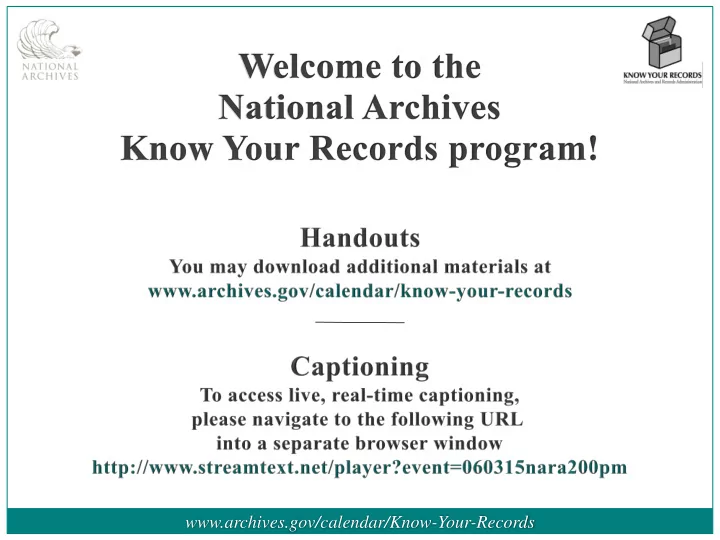

www.archives.gov/calendar/Know-Your-Records
The National Archives and Records Administration (NARA) is the nation's record keeper. Of all the documents and materials created in the course of business conducted by the United States Federal government, only 1% – 3% are determined permanently valuable. Those valuable records are preserved and are available to you, whether you want to see if they contain clues about your family’s history, need to prove a veteran’s military service, or are researching an historical topic that interests you. www.archives.gov/calendar/Know-Your-Records
THE KNOW YOUR RECORDS PROGRAM consists of free events with up-to-date information about our holdings. Events offer opportunities for you to learn about the National Archives’ records through ongoing lectures, monthly genealogy programs, and the annual genealogy fair. Additional resources include an online genealogy tutorial, reference reports for genealogical research, and the newsletter Researcher News . www.archives.gov/calendar/Know-Your-Records
Rebecca Sharp Archives Specialist Rebecca Sharp will discuss The Medical and Surgical History of the War of the Rebellion, 1861 – 1865 . This published source contains information about Civil War medical and surgical procedures as well as case studies. www.archives.gov/calendar/Know-Your-Records
Rebecca Sharp is an Archives Specialist in the National Archives Reference Section, Textual Records Division, in Washington, DC. She specializes in Federal records of genealogical interest as well as Civilian Rebecca Sharp Records . She graduated with departmental Archives Specialist National Archives honors in History from McDaniel College Washington, DC (established as Western Maryland College). www.archives.gov/calendar/Know-Your-Records
Medicine on the Civil War Battlefield Rebecca Sharp National Archives and Records Administration
Mathew Brady Photograph – In the trenches before Petersburg, Va.
Ailments & Diseases • army itch • parasites • asthma • pleurisy • bronchitis • pneumonia • cardiac disease • scarlet fever • conjunctivitis • scurvy • constipation • smallpox • consumption • tetanus • diarrhea • tonsillitis • diphtheria • typhoid fever • dysentery • typhus fever • malaria • venereal disease • measles • yellow fever
Injuries • abdominal wounds • puncture wounds • accidental • sabre wounds • aneurisms • spinal injuries • bayonet wounds • sprains • chest wounds • struck by lightening • contusions • sunstroke • facial wounds • wounds of the heart • fractures • wounds caused by large projectiles • frostbite • gunshot wounds • head wounds • injuries of the lower extremities • joint injuries • neck injuries • paralysis Mathew Brady photograph – Artillery Park
Surgical Procedures • amputations • ball extractions • blood-letting • ligations • plastic operations • removal of foreign bodies (buttons, clothing, wire) • tracheotomy • trephining
Medical Supplies • alcohol • ammonia salt • calomel • cathartics • dover’s powder • laudanum • iodide of potassium • morphia • milk punch • opium • quinine
Mathew Brady Photograph – Wounded soldiers under trees, Marye’s Heights, Fredericksburg. After the battle of Spotsylvania
Mathew Brady Photograph – Ambulance of 6th Corps
Mathew Brady Photograph – Quarters of the United States Sanitary Commission
Mathew Brady Photograph – U.S. Military R.R., City Point, Va. Field Hospital
Richmond, Virginia, 1865 Records of the Office of the Chief of Engineers (RG 77)
Chimborazo Hospital, (Confederate) Richmond, Va. May 1865 – Library of Congress
Amputation being performed in a hospital tent, Gettysburg – Records of the National Park Service (RG 79)
Carded Medical Files
Compiled Military Service Records
Pension Records
Mathew Brady Photograph – National Cemetery
QUESTIONS
Thank you for attending! www.archives.gov/calendar/Know-Your-Records
Recommend
More recommend